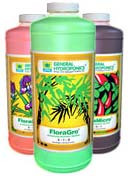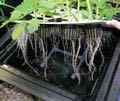Nutrients for Hydroponic systems
There are two kinds of formulations for hydroponic nutrients – synthetic (or refined mineral, or salt-based) and organic based. A synthetic nutrient is in the form of soluble salts formulated by humans for plant consumption. Similar to the way table salt (NaCl) disassociates in water to form Na+ (cation) and Cl- (anion), the pre-formulated fertilizer salts disassociate into the correct spectrum concentrations of necessary ion components needed for plant growth.
100% Organic fertilizer components are dependent upon organisms in the soil to convert the "organic" materials into an inorganic useable form for plants. Because of the non-soluble of many natural sources of nutrition, organic based hydroponic nutrients have 20-30% fertilizer salts with the rest being soluble “organic” components, such as guanos, plant extracts, worm castings, potash, kelps, etc.
Because all of the components are not similar in structure and properties they disassociate at different rates in the “universal solvent” creating a slight pH fluctuation. This is the major difference between synthetic and organic based nutrients, but is easily overcome with patience and practice.
Having said this, there is absolutely no difference in the final ion product with respect to synthetic nutrients and organic based nutrients. An ion is an ion. It is simply a different way of delivering the food to the plant. As has been stated, plants “eat” ions in an inorganic form in the end anyway. In other words, plants do not eat guano ions, or kelp ions; they eat the inorganic constituents of these materials after they have been broken down or dissolved in water.
A 100% hydroponic nutrient has not been formulated because in nature microorganisms and specific processes break down organic compounds to make them available to plants (i.e. “slow release” fertilizers). Since many organic materials are not soluble in water, they cannot be utilized in a hydroponic system, yet. There is great potential in the ability of scientists to locate unique plant extracts and formulations conducive to this idea. There is currently much energy being devoted to the technology.




